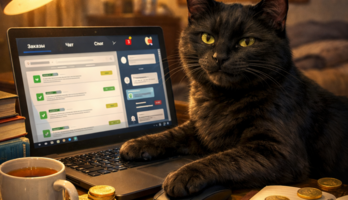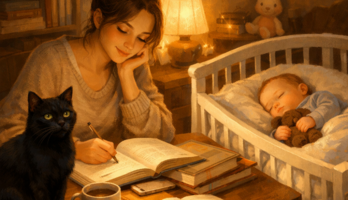flynn_gillian_gone_girl (1) (858987), страница 7
Текст из файла (страница 7)
You spend another hourtrying to nd each other, to recognize each other, and you drink a little too much andtry a little too hard. And you go home to a cold bed and think, That was ne. And yourlife is a long line of fine.And then you run into Nick Dunne on Seventh Avenue as you’re buying dicedcantaloupe, and pow, you are known, you are recognized, the both of you. You bothnd the exact same things worth remembering.
(Just one olive, though.) You have thesame rhythm. Click. You just know each other. All of a sudden you see reading in bed andwa es on Sunday and laughing at nothing and his mouth on yours. And it’s so far beyondne that you know you can never go back to ne. That fast. You think: Oh, here is therest of my life. It’s finally arrived.NICK DUNNETHE DAY OFI waited for the police rst in the kitchen, but the acrid smell of the burnt teakettlewas curling up in the back of my throat, underscoring my need to retch, so I drifted outon the front porch, sat on the top stair, and willed myself to be calm.
I kept tryingAmy’s cell, and it kept going to voice mail, that quick-clip cadence swearing she’d phoneright back. Amy always phoned right back. It had been three hours, and I’d left vemessages, and Amy had not phoned back.I didn’t expect her to. I’d tell the police: Amy would never have left the house withthe teakettle on.
Or the door open. Or anything waiting to be ironed. The woman gotshit done, and she was not one to abandon a project (say, her xer-upper husband, forinstance), even if she decided she didn’t like it. She’d made a grim gure on the Fijibeach during our two-week honeymoon, battling her way through a million mysticalpages of The Wind-Up Bird Chronicle, casting pissy glances at me as I devoured thrillerafter thriller. Since our move back to Missouri, the loss of her job, her life had revolved(devolved?) around the completion of endless tiny, inconsequential projects. The dresswould have been ironed.And there was the living room, signs pointing to a struggle.
I already knew Amy wasn’tphoning back. I wanted the next part to start.It was the best time of day, the July sky cloudless, the slowly setting sun a spotlighton the east, turning everything golden and lush, a Flemish painting. The police rolledup.
It felt casual, me sitting on the steps, an evening bird singing in the tree, these twocops getting out of their car at a leisurely pace, as if they were dropping by aneighborhood picnic. Kid cops, mid-twenties, con dent and uninspired, accustomed tosoothing worried parents of curfew-busting teens. A Hispanic girl, her hair in a longdark braid, and a black guy with a marine’s stance. Carthage had become a bit (a verytiny bit) less Caucasian while I was away, but it was still so severely segregated that theonly people of color I saw in my daily routine tended to be occupational roamers:delivery men, medics, postal workers.
Cops. (“This place is so white, it’s disturbing,” saidAmy, who, back in the melting pot of Manhattan, counted a single African-Americanamong her friends. I accused her of craving ethnic window dressing, minorities asbackdrops. It did not go well.)“Mr. Dunne? I’m O cer Velásquez,” said the woman, “and this is O cer Riordan.We understand you’re concerned about your wife?”Riordan looked down the road, sucking on a piece of candy. I could see his eyesfollow a darting bird out over the river.
Then he snapped his gaze back toward me, hiscurled lips telling me he saw what everyone else did. I have a face you want to punch:I’m a working-class Irish kid trapped in the body of a total trust-fund douchebag. I smilea lot to make up for my face, but this only sometimes works. In college, I even woreglasses for a bit, fake spectacles with clear lenses that I thought would lend me ana able, unthreatening vibe.
“You do realize that makes you even more of a dick?” Goreasoned. I threw them out and smiled harder.I waved in the cops: “Come inside the house and see.”The two climbed the steps, accompanied by the squeaking and shu ing noises oftheir belts and guns. I stood in the entry to the living room and pointed at thedestruction.“Oh,” said O cer Riordan, and gave a brisk crack of his knuckles. He suddenlylooked less bored.Riordan and Velásquez leaned forward in their seats at the dining room table as theyasked me all the initial questions: who, where, how long. Their ears were literallypricked.
A call had been made out of my hearing, and Riordan informed me thatdetectives were being dispatched. I had the grave pride of being taken seriously.Riordan was asking me for the second time if I’d seen any strangers in theneighborhood lately, was reminding me for the third time about Carthage’s roving bandsof homeless men, when the phone rang.
I launched myself across the room and grabbedit.A surly woman’s voice: “Mr. Dunne, this is Comfort Hill Assisted Living.” It waswhere Go and I boarded our Alzheimer’s-riddled father.“I can’t talk right now, I’ll call you back,” I snapped, and hung up. I despised thewomen who sta ed Comfort Hill: unsmiling, uncomforting. Underpaid, gruelinglyunderpaid, which was probably why they never smiled or comforted. I knew my angertoward them was misdirected—it absolutely infuriated me that my father lingered onwhile my mom was in the ground.It was Go’s turn to send the check. I was pretty sure it was Go’s turn for July. And I’msure she was positive it was mine.
We’d done this before. Go said we must be mutuallysubliminally forgetting to mail those checks, that what we really wanted to forget wasour dad.I was telling Riordan about the strange man I’d seen in our neighbor’s vacated housewhen the doorbell rang. The doorbell rang. It sounded so normal, like I was expecting apizza.The two detectives entered with end-of-shift weariness. The man was rangy and thin,with a face that tapered severely into a dribble of a chin. The woman was surprisinglyugly—brazenly, beyond the scope of everyday ugly: tiny round eyes set tight as buttons,a long twist of a nose, skin spackled with tiny bumps, long lank hair the color of a dustbunny. I have an a nity for ugly women. I was raised by a trio of women who werehard on the eyes—my grandmother, my mom, her sister—and they were all smart andkind and funny and sturdy, good, good women.
Amy was the rst pretty girl I everdated, really dated.The ugly woman spoke rst, an echo of Miss O cer Velásquez. “Mr. Dunne? I’mDetective Rhonda Boney. This is my partner, Detective Jim Gilpin. We understand thereare some concerns about your wife.”My stomach growled loud enough for us all to hear it, but we pretended we didn’t.“We take a look around, sir?” Gilpin said. He had eshy bags under his eyes andscraggly white whiskers in his mustache.
His shirt wasn’t wrinkled, but he wore it like itwas; he looked like he should stink of cigarettes and sour co ee, even though he didn’t.He smelled like Dial soap.I led them a few short steps to the living room, pointed once again at the wreckage,where the two younger cops were kneeling carefully, as if waiting to be discovereddoing something useful. Boney steered me toward a chair in the dining room, away frombut in view of the signs of struggle.Rhonda Boney walked me through the same basics I’d told Velásquez and Riordan,her attentive sparrow eyes on me.
Gilpin squatted down on a knee, assessing the livingroom.“Have you phoned friends or family, people your wife might be with?” RhondaBoney asked.“I … No. Not yet. I guess I was waiting for you all.”“Ah.” She smiled. “Let me guess: baby of the family.”“What?”“You’re the baby.”“I have a twin sister.” I sensed some internal judgment being made. “Why?” Amy’sfavorite vase was lying on the oor, intact, bumped up against the wall. It was awedding present, a Japanese masterwork that Amy put away each week when ourhousecleaner came because she was sure it would get smashed.“Just a guess of mine, why you’d wait for us: You’re used to someone else alwaystaking the lead,” Boney said.
“That’s what my little brother is like. It’s a birth-orderthing.” She scribbled something on a notepad.“Okay.” I gave an angry shrug. “Do you need my sun sign too, or can we getstarted?”Boney smiled at me kindly, waiting.“I waited to do something because, I mean, she’s obviously not with a friend,” I said,pointing at the disarray in the living room.“You’ve lived here, what, Mr. Dunne, two years?” she asked.“Two years September.”“Moved from where?”“New York.”“City?”“Yes.”She pointed upstairs, asking permission without asking, and I nodded and followedher, Gilpin following me.“I was a writer there,” I blurted out before I could stop myself. Even now, two yearsback here, and I couldn’t bear for someone to think this was my only life.Boney: “Sounds impressive.”Gilpin: “Of what?”I timed my answer to my stair climbing: I wrote for a magazine (step), I wrote aboutpop culture (step) for a men’s magazine (step).
At the top of the stairs, I turned to seeGilpin looking back at the living room. He snapped to.“Pop culture?” he called up as he began climbing. “What exactly does that entail?”“Popular culture,” I said. We reached the top of the stairs, Boney waiting for us.“Movies, TV, music, but, uh, you know, not high arts, nothing hifalutin.” I winced:hifalutin? How patronizing. You two bumpkins probably need me to translate myEnglish, Comma, Educated East Coast into English, Comma, Midwest Folksy.
Me do sumscribbling of stuffs I get in my noggin after watchin’ them movin’ pitchers!“She loves movies,” Gilpin said, gesturing toward Boney. Boney nodded: I do.“Now I own The Bar, downtown,” I added. I taught a class at the junior college too,but to add that suddenly felt too needy. I wasn’t on a date.Boney was peering into the bathroom, halting me and Gilpin in the hallway. “TheBar?” she said. “I know the place. Been meaning to drop by. Love the name. Very meta.”“Sounds like a smart move,” Gilpin said.
Boney made for the bedroom, and wefollowed. “A life surrounded by beer ain’t too bad.”“Sometimes the answer is at the bottom of a bottle,” I said, then winced again at theinappropriateness.We entered the bedroom.Gilpin laughed. “Don’t I know that feeling.”“See how the iron is still on?” I began.Boney nodded, opened the door of our roomy closet, and walked inside, ipping onthe light, uttering her latexed hands over shirts and dresses as she moved toward theback. She made a sudden noise, bent down, turned around—holding a perfectly squarebox covered in elaborate silver wrapping.My stomach seized.“Someone’s birthday?” she asked.“It’s our anniversary.”Boney and Gilpin both twitched like spiders and pretended they didn’t.By the time we returned to the living room, the kid o cers were gone.














